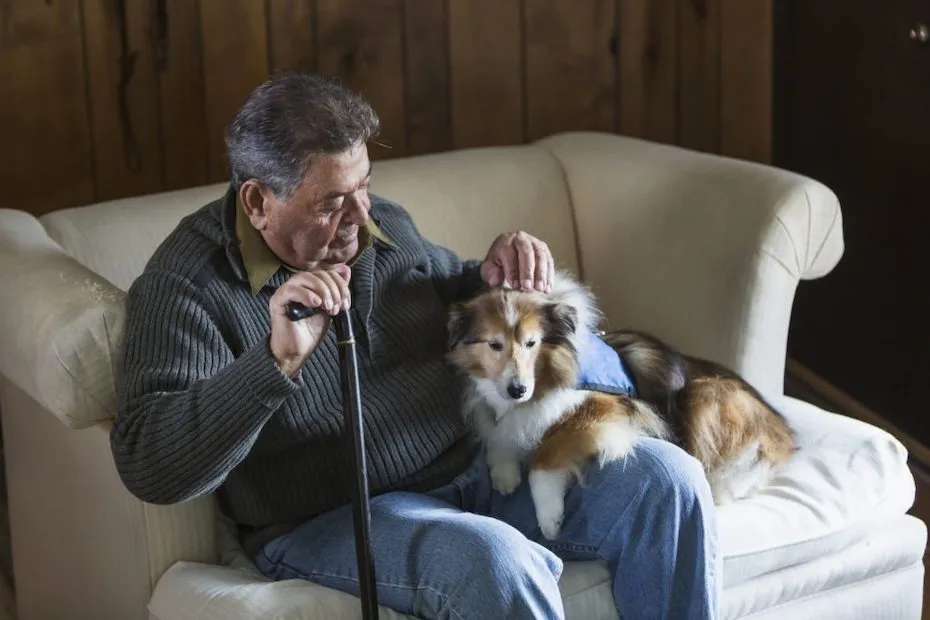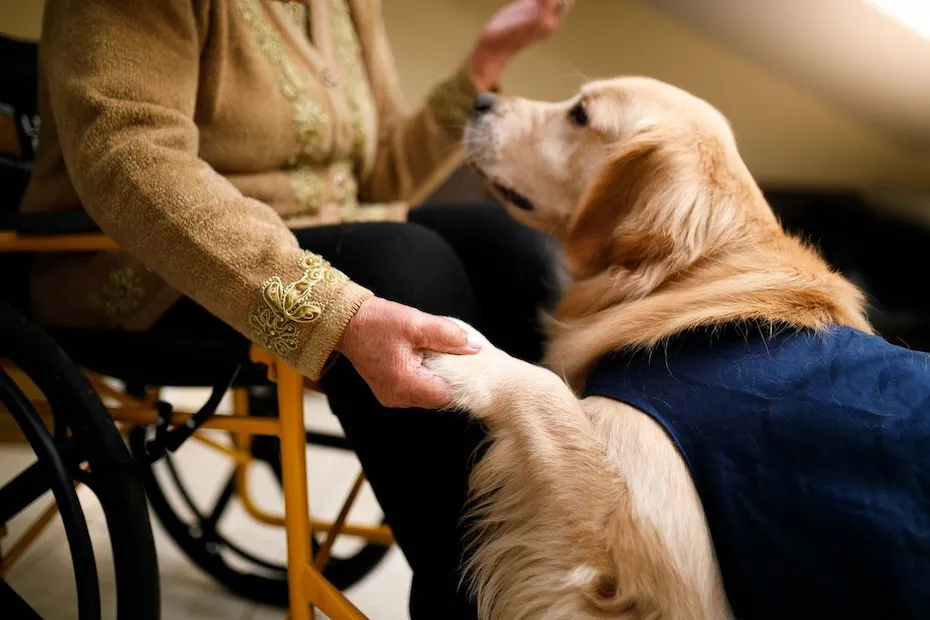Service dogs are more than just pets; they are highly trained partners who significantly enhance the lives of individuals with disabilities. These remarkable canines assist with a wide array of daily tasks, providing crucial support for physical, sensory, psychiatric, intellectual, and mental challenges. From alerting to medical emergencies to providing constant companionship, service dogs offer a unique blend of practical assistance and unwavering emotional support. This guide delves into the world of service dogs, exploring the qualities that make certain breeds ideal candidates, and detailing the various roles they fulfill.
Service dogs possess full public access rights, allowing them to accompany their handlers into virtually any public space, including restaurants, transportation, and medical facilities. While there isn’t a definitive, universally established list of every type of service dog, their roles are defined by the specific tasks they are trained to perform for their human partners. Understanding the diverse capabilities of these dogs can illuminate how they empower individuals to live more independent and fulfilling lives.
What Makes a Dog a Good Service Dog Candidate?
The journey to becoming a service dog is rigorous, requiring specific traits that go beyond innate canine abilities. While a dog’s keen senses, such as an extraordinary sense of smell that is tens of thousands of times more powerful than a human’s, are a foundation, it’s a combination of temperament, intelligence, and a strong desire to work that truly distinguishes a service dog. The breeds most frequently chosen for service work share these key characteristics:
- A strong work drive: These dogs are happiest when engaged in tasks and are eager to please their handlers. They thrive on having a job to do.
- A calm and steady temperament: Service dogs must remain composed in various public settings, unaffected by loud noises, crowds, or unfamiliar stimuli. They should not be easily startled or prone to disruptive behaviors.
- High intelligence and trainability: The ability to learn and execute complex tasks reliably is paramount. This requires good problem-solving skills and a quick grasp of training cues.
- A friendly and approachable disposition: While focused on their handler, service dogs must be comfortable and polite around people and other animals they encounter.
- A deep bond with their handler: The ability to form a strong, trusting connection allows the dog to intuitively understand and respond to their handler’s needs.
Considering these essential qualities, several breeds consistently emerge as top contenders for service dog roles. These include the ever-popular Labrador Retriever, Golden Retriever, and German Shepherd, known for their trainability and versatility. Poodles, with their intelligence and hypoallergenic coats, are also excellent choices. Other breeds like Boxers, Great Danes, Border Collies, Bernese Mountain Dogs, Pomeranians, and Portuguese Water Dogs also possess the characteristics that lend themselves well to specialized service dog training. Exploring [best dog breed for anxiety service dog](https://dogcarestory.com/best-dog-breed-for-anxiety-service-dog/) can offer further insight into breed selection.
Understanding the Different Types of Service Dogs
The spectrum of service dog tasks is vast, tailored to meet the unique needs of individuals with different disabilities. Each type of service dog is trained to perform specific functions that directly alleviate or assist with a particular challenge.
Allergy Detection Dogs
These highly specialized dogs are trained to detect and alert their handlers to the presence of specific allergens, such as peanuts, gluten, or eggs. For individuals with severe food allergies who can experience life-threatening anaphylactic reactions from even minimal exposure, these dogs are invaluable. An allergy detection dog can identify a dangerous allergen before their handler comes into contact with it, providing a critical layer of safety. They are often partnered with children, offering them greater independence and providing immense peace of mind for their parents. Many allergy detection dogs wear vests that include pockets for essential medical information and emergency medication, often with a clear indication for first responders to check these pockets in a crisis.
 Service dog sitting on couch with man
Service dog sitting on couch with man
Autism Service Dogs
Autism service dogs are frequently partnered with children and adults on the autism spectrum to help them navigate social interactions and manage sensory sensitivities. Dogs possess a natural ability to create a sense of predictability and comfort, making them excellent companions for individuals who may struggle with social cues and forming connections. These dogs can act as social icebreakers, helping their partners engage more confidently with peers and in new environments. They offer non-judgmental affection, which can improve communication skills and help individuals regulate their emotions. Furthermore, autism service dogs are trained to prevent their handlers from wandering into dangerous situations and can track them if they do stray. They can also intervene in repetitive or harmful behaviors and alert caregivers to potential dangers. For younger or non-verbal handlers, these dogs often carry emergency protocols and contact information. You can learn more about [best service dog breeds for autism](https://dogcarestory.com/best-service-dog-breeds-for-autism/).
Diabetic Alert Dogs
Diabetic alert dogs (DAD) are specifically trained to detect subtle changes in a person’s blood sugar levels, alerting them to potentially dangerous highs (hyperglycemia) or lows (hypoglycemia). Upon receiving an alert, the handler can test their blood sugar and take appropriate action, such as administering insulin or consuming glucose. These dogs significantly enhance a person’s independence and provide a crucial safety net. DADs can also be trained to alert other household members or activate an alarm if their handler requires immediate medical attention. In some cases, they can even be trained to dial 911 using a specialized phone. Carrying emergency protocols in their vests is also a common practice for these vital canine partners.
Guide Dogs
Perhaps the most widely recognized type of service dog, guide dogs are instrumental in assisting individuals who are blind or have low vision navigate their surroundings. They are typically fitted with a special harness that includes a rigid handle, allowing their handler to feel the dog’s movements and subtle cues. Unlike other service dogs, guide dogs practice “selective disobedience.” This means they are trained to obey commands but will override a direct order if it would place their handler in danger. For instance, if commanded to cross a street, a guide dog will refuse if there is oncoming traffic. Common breeds for guide dogs include Labradors, Golden Retrievers, and German Shepherds. For handlers with allergies, hypoallergenic breeds like Labradoodles or Poodles are excellent alternatives. For more on breed selection, consider [best breed of dog for service animal](https://dogcarestory.com/best-breed-of-dog-for-service-animal/).
Hearing Dogs
Hearing dogs are specifically trained to assist individuals who are deaf or hard of hearing. Their primary role is to alert their handler to important sounds in their environment. When a designated sound occurs, the dog will make physical contact, such as nudging or pawing, and then lead their handler towards the source of the sound. These alerts can include critical signals like smoke or fire alarms, doorbells, knocking, phones ringing, alarm clocks, and even the handler being called by name. By increasing their handler’s awareness, hearing dogs significantly boost independence and security both inside and outside the home. Popular breeds for hearing dogs include Labradors, Golden Retrievers, Cocker Spaniels, and Poodles. While not mandated, some handlers choose bright orange vests for increased visibility.
 Service dog with woman in wheelchair
Service dog with woman in wheelchair
Mobility Assistance Dogs
Many individuals with physical disabilities rely on mobility assistance dogs to help them perform essential daily tasks. These tasks can include retrieving dropped items, opening doors, pressing automatic door buttons, and turning on lights. Mobility support dogs are often partnered with individuals who have conditions such as spinal cord injuries, brain injuries, muscular dystrophy, arthritis, or cerebral palsy. Some mobility assistance dogs are specially trained for bracing, providing support and stability for handlers with balance issues. These dogs need to be large and strong enough to safely assist, typically weighing 55 pounds or more, and often wear custom-fitted harnesses designed for this purpose. Certain mobility assistance dogs are also adept at helping wheelchair users, assisting with object retrieval, door opening, and transfers between surfaces like chairs, beds, or bathtubs. Their specialized harnesses can even aid in pulling a wheelchair. Exploring [best breed for anxiety service dog](https://dogcarestory.com/best-breed-for-anxiety-service-dog/) might indirectly shed light on the physical capabilities of dogs suited for assistance.
Psychiatric Service Dogs
Psychiatric service dogs (PSDs) provide crucial support for individuals managing mental health conditions such as depression, anxiety, and post-traumatic stress disorder (PTSD). These dogs are trained to sense subtle shifts in their handler’s emotional state, often alerting them to impending negative symptoms like anxiety attacks or flashbacks. The benefits of PSDs for these conditions are profound. They can encourage self-care routines, motivate individuals to engage with the outside world, and provide a calming presence. For veterans with PTSD, PSDs can act as a literal buffer, creating a sense of personal space in crowded environments and enhancing confidence when entering familiar or unfamiliar settings. It is important to distinguish psychiatric service dogs from emotional support animals or therapy dogs; PSDs undergo extensive task-specific training and are legally recognized as service animals, not pets. For those seeking a companion for anxiety, research into [best small dog breeds for emotional support](https://dogcarestory.com/best-small-dog-breeds-for-emotional-support/) might offer broader insights into canine companionship, though it’s crucial to remember the specific training and legal standing of a PSD.
Seizure Alert Dogs
Seizure alert dogs are trained to assist individuals before, during, and after a seizure. Their responsibilities can include seeking help or contacting emergency services via a specialized K-9 alert phone, helping their handler regain consciousness post-seizure, or physically moving them to a safer location if a seizure occurs in a dangerous spot. Some are also trained in deep pressure stimulation techniques, which can potentially help to shorten the duration of a seizure. Additionally, they can be trained to retrieve medication for their handler as they recover. There is ongoing scientific and medical discussion regarding the trainability of seizure alert dogs. While many believe dogs can be trained to predict and alert to seizures, others suggest that these behaviors may stem more naturally from a dog’s intuition and the deep bond shared with their human partner.
Service dogs are an indispensable part of many people’s lives, offering both practical assistance and profound emotional connection. The dedication and specialized training these dogs receive enable them to perform tasks that significantly improve the independence, safety, and quality of life for their handlers.
References
- Americans with Disabilities Act (ADA). (n.d.).
- AKC. (n.d.). Service Dogs vs. Therapy Dogs vs. Emotional Support Animals.
- AnythingPawsable. (n.d.). Types of Service Dogs.
- Dogster. (n.d.). 10 Types of Service Dogs and What They Do.
- K9OfMine. (n.d.). Best Breeds for Service Dogs.
- SitStay. (n.d.). What Are the Different Types of Service Dogs and Their Jobs?
- The Spruce Pets. (n.d.). How Dogs’ Sense of Smell Compares to Ours.
- UDServices. (n.d.). Personal Care & Independence: Service Dogs.
- UDServices. (n.d.). Blog: Employees with Autism.
- UDServices. (n.d.). Blog: Pups in the Classroom.
- AI Media. (n.d.). 8 Types of Assistance Dogs.
